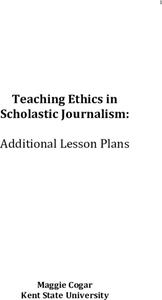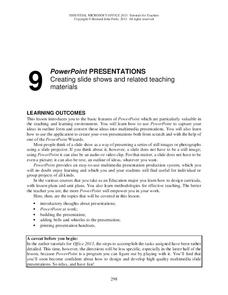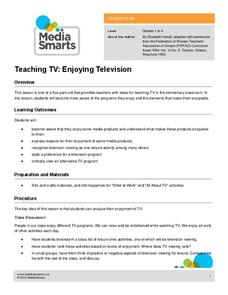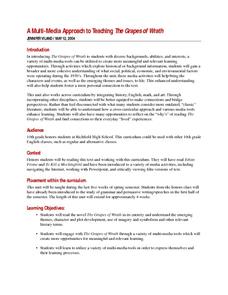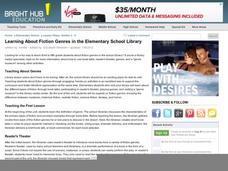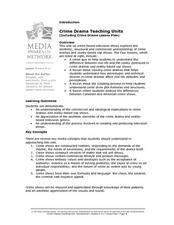The New York Times
Evaluating Sources in a ‘Post-Truth’ World: Ideas for Teaching and Learning about Fake News
The framers of the United States Constitution felt a free press was so essential to a democracy that they granted the press the protection it needed to hold the powerful to account in the First Amendment. Today, digital natives need to...
Newspaper Association of America
Using the Newspaper to Teach the Five Freedoms of the First Amendment
Of all the amendments found in The Bill of Rights, the First Amendment contains some of the most important freedoms for American citizens. A unit plan on the First Amendment features interactive lesson plans designed to teach about those...
Boys Town
More Tools for Teaching Social Skills in School
Put an end to wasted instructional time with this lesson on responsibility and preparedness. After completing this series of activities students will learn the importance of these social skills not only in the classroom, but at home and...
Kent State University
Teaching Ethics in Scholastic Journalism
Events in recent years have underscored the importance of a free and independent press in a democracy. Young journalists engage in lessons about the function of journalism in a democratic society, practice the steps of Bok's Ethical...
Hot Docs
Docs for School: Viewing and Teaching Guide
Teaching documentary in your class? Inform your instruction with a guide meant to support teachers as they begin with documentary. The resource includes information on what a documentary is as well as documentary modes, elements, and...
Close Up Foundation
Teach the Vote
Why is voting important? A social studies unit presents a non-partisan approach to the importance of voting, to voting laws and procedures, and to resources that voters need to become informed voters.
Scholastic
The Flight of Amelia Earhart Teaching Guide
Amelia Earhart's accomplishments and strength of character extend beyond her status as one of the first female aviators in America. Elementary and middle schoolers learn about Earhart's early life and the historical context surrounding...
Curated OER
Teaching the Instruments of the Orchestra to Young Students using the San Francisco Symphony Kids’ Website
Using the San Francisco Children's Orchestra web site, first graders build listening and instrument identification skills. Each child wears head phones, listens to ID, and finds various instruments on the included worksheet.
Media Smarts
Teaching TV: Critically Evaluating TV
Mercer Mayer's There's a Nightmare in my Closet creates the framework for a specific discussion of nightmares generated by TV and a more general discussion of other emotions evoked by programs.
Curated OER
Creating Slide Shows and Related Teaching Materials
Everything you need to know on creating a PowerPoint is provided here From how to build the presentation, to adding "bells and whistles," and printing handouts from a PowerPoint, is the focus of the lesson.
George W. Bush Presidential Library and Museum
Teaching Primary and Secondary Sources
What makes a source primary or secondary? Middle schoolers read a definition of each term before exploring different examples and applying their knowledge to a research project.
Media Smarts
Teaching TV: Enjoying Television
What makes a TV program enjoyable? As an introduction to media analysis, kids identify their favorite programs and the elements they find engaging.
Media Smarts
Teaching TV: Television Techniques
As part of a five-lesson unit on how television uses technology and film techniques to communicate meaning, elementary students create their own media productions that demonstrate their understanding of these concepts.
The New York Times
The Careful Reader: Teaching Critical Reading Skills with the New York Times
The 11 lessons in this educators' guide focus on using newspapers to develop critical reading skills in the content areas.
Curated OER
A Multi-Media Approach to Teaching The Grapes of Wrath
Integrate history, math, and art into a study of The Grapes of Wrath with a series of activities that ask learners to investigate the social, political, economic, and environmental factors at play during the 1930s. Designed to be used...
American Psychological Association
Counting Fidgets: Teaching the Complexity of Naturalistic Observation
Why do psychologists conduct experiments in controlled laboratory settings? High schoolers gain an understanding of the importance of controls with an activity that involves naturalistic observations with no imposed controls.
PBS
How to Teach Your Students about Fake News
What media literacy skills do people need to evaluate a news source? Scholars listen to and discuss an NPR story about how fake headlines often dupe young people and adults alike. Next, they study news stories, using a fact-checking...
Education Bureau of Hong Kong
Evaluating Casual Claims
Responsible decision making relies on the ability to a recognize, analyze, and evaluate claims. The worksheets and activities in this 32-page packet teach learners how to distinguish among opinions, reasoned arguments, facts, and logical...
News Literacy Project
News Goggles: Identifying the News Source
A 25-slide presentation teaches viewers how to identify the source of stories in newspapers and online news sites. The slides show how to locate the byline where either the reporter's name or the wire service that provided the story can...
Curated OER
Learning About Fiction Genres in the Elementary School Library
Teaching about fiction genres can be challenging. The lesson here, designed for library media specialists, offers a fun way to do it. In the lesson, learners visit the library and learn about the different types of fiction through book...
Curated OER
Crime Drama Teaching Units
Investigate the nature of crime dramas on television. What exactly are they trying to portray? Questions and a comparison chart support learners as they watch shows from Canada, Great Britain, and the United States. An oral presentation...
NPR
Teaching Podcasting: Podcasting Overview
Listen up! After engaging in a discussion about podcasts, scholars listen to some examples of podcast episodes and radio shows. Next, listeners discuss the difference between scripted and question-and-answer podcasts.
NPR
Teaching Podcasting: Choosing a Topic
Pick a topic, any topic! Working in small groups, scholars choose three topics they think would make interesting podcasts. Next, each group shares their ideas with the class to narrow down their choices.
NPR
Teaching Podcasting: Planning the Story
Without structure, things fall apart. Scholars discuss the importance of structuring a podcast to tell a story that makes sense. They walk around the classroom, stopping at stations to answer questions on posters about planning their...
Other popular searches
- Substitute Teaching
- Teaching Phonics
- Teaching Main Idea
- Teaching Inference
- Teaching Volleyball
- Teaching Cause and Effect
- Teaching Point of View
- Teaching Personal Hygiene
- Teaching Poetry
- Teaching Consonant Blends
- Teaching Resources
- Nursing Teaching Plans





